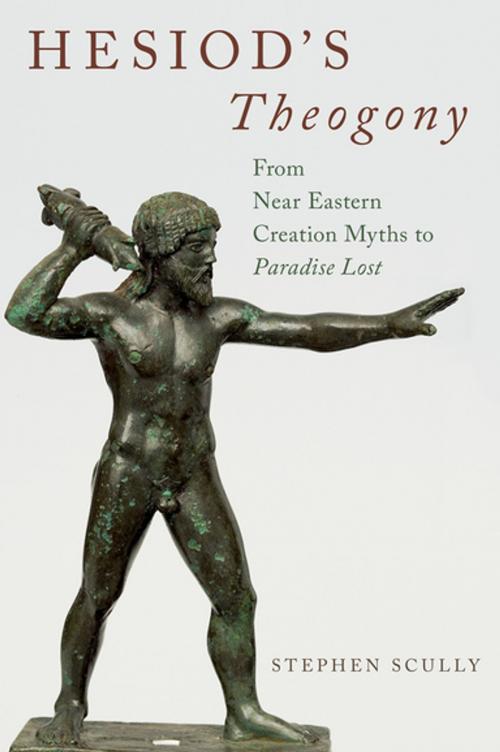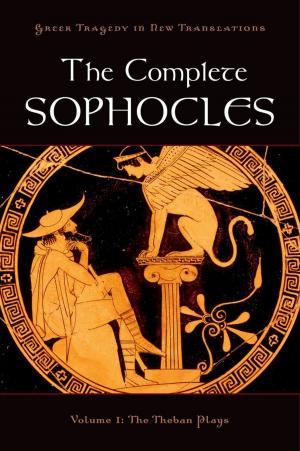Hesiod's Theogony
from Near Eastern Creation Myths to Paradise Lost
Fiction & Literature, Literary Theory & Criticism, Ancient & Classical, Nonfiction, History, Ancient History, Greece| Author: | Stephen Scully | ISBN: | 9780190463847 |
| Publisher: | Oxford University Press | Publication: | October 1, 2015 |
| Imprint: | Oxford University Press | Language: | English |
| Author: | Stephen Scully |
| ISBN: | 9780190463847 |
| Publisher: | Oxford University Press |
| Publication: | October 1, 2015 |
| Imprint: | Oxford University Press |
| Language: | English |
Stephen Scully both offers a reading of Hesiod's Theogony and traces the reception and shadows of this authoritative Greek creation story in Greek and Roman texts up to Milton's own creation myth, which sought to "soar above th' Aonian Mount [i.e., the Theogony]...and justify the ways of God to men." Scully also considers the poem in light of Near Eastern creation stories, including the Enûma elish and Genesis, as well as the most striking of modern "scientific myths," Freud's Civilization and its Discontents. Scully reads Hesiod's poem as a hymn to Zeus and a city-state creation myth, arguing that Olympus is portrayed as an idealized polity and--with but one exception--a place of communal harmony. This reading informs his study of the Theogony's reception in later writings about polity, discord, and justice. The rich and various story of reception pays particular attention to the long Homeric Hymns, Solon, the Presocratics, Pindar, Aeschylus, Aristophanes, and Plato in the Archaic and Classical periods; to the Alexandrian scholars, Callimachus, Euhemerus, and the Stoics in the Hellenistic period; to Ovid, Apollodorus, Lucian, a few Church fathers, and the Neoplatonists in the Roman period. Tracing the poem's reception in the Byzantine, medieval, and early Renaissance, including Petrarch and Erasmus, the book ends with a lengthy exploration of Milton's imitations of the poem in Paradise Lost. Scully also compares what he considers Hesiod's artful interplay of narrative, genealogical lists, and keen use of personified abstractions in the Theogony to Homeric narrative techniques and treatment of epic verse.
Stephen Scully both offers a reading of Hesiod's Theogony and traces the reception and shadows of this authoritative Greek creation story in Greek and Roman texts up to Milton's own creation myth, which sought to "soar above th' Aonian Mount [i.e., the Theogony]...and justify the ways of God to men." Scully also considers the poem in light of Near Eastern creation stories, including the Enûma elish and Genesis, as well as the most striking of modern "scientific myths," Freud's Civilization and its Discontents. Scully reads Hesiod's poem as a hymn to Zeus and a city-state creation myth, arguing that Olympus is portrayed as an idealized polity and--with but one exception--a place of communal harmony. This reading informs his study of the Theogony's reception in later writings about polity, discord, and justice. The rich and various story of reception pays particular attention to the long Homeric Hymns, Solon, the Presocratics, Pindar, Aeschylus, Aristophanes, and Plato in the Archaic and Classical periods; to the Alexandrian scholars, Callimachus, Euhemerus, and the Stoics in the Hellenistic period; to Ovid, Apollodorus, Lucian, a few Church fathers, and the Neoplatonists in the Roman period. Tracing the poem's reception in the Byzantine, medieval, and early Renaissance, including Petrarch and Erasmus, the book ends with a lengthy exploration of Milton's imitations of the poem in Paradise Lost. Scully also compares what he considers Hesiod's artful interplay of narrative, genealogical lists, and keen use of personified abstractions in the Theogony to Homeric narrative techniques and treatment of epic verse.















